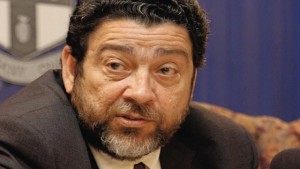 KINGSTOWN, St Vincent (CMC) – St Vincent and the Grenadines two main political leaders are urging citizens to seek advice before making a decision on whether or not to withdraw their funds from the RBTT Bank here following a decision by the financial institution to increase fees for its services.
KINGSTOWN, St Vincent (CMC) – St Vincent and the Grenadines two main political leaders are urging citizens to seek advice before making a decision on whether or not to withdraw their funds from the RBTT Bank here following a decision by the financial institution to increase fees for its services.
Many customers have descended on the bank indicating a willingness to withdraw their funds after the Trinidad-headquartered financial institution announced an EC$25 (One EC dollar=US$0.37 cents) monthly service fee. “I would tell persons to make their own judgement,” Prime Minister and Minister of Finance Ralph Gonsalves said on radio, a day after Opposition Leader Arnhim Eustace had told listeners to do the same.
Gonsalves said that the fees “just came out of nowhere and they are excessive” and that if a depositor has a sufficiency of money and feel they can bear the EC$300 annual fee, they can choose to do so. “If not, move it and put it somewhere else. The only thing is this: I believe that RBTT is not mourning the loss of a number of small accounts you know. Because it is expensive for them to maintain small accounts,” Gonsalves said.
He said he had been waiting for the Eastern Caribbean Central Bank to make a statement on the matter — which they did on Monday. The ECCB said it was concerned about the fees that some commercial banks across the currency union has levelled on accounts, but noted that it does not have the legislative authority to regulate these fees.
Gonsalves said he has repeatedly raised the issue of these charges at meetings of the Monetary Council of the Eastern Caribbean Currency Union. Gonsalves said he had raised the issue with the present Governor of the Bank Timothy Antoine and his predecessor, Sir Dwight Venner. “They, of course, quite properly respond by saying they have no legislative control, neither do we, over a bank imposing certain fees and charges.
“Those are matters which the market determines, though of course, the Central Bank, upon a decision by the monetary council, would determine minimum deposit rates,” Gonsalves said. Gonsalves noted that a small depositor who has EC$1,000 in an account at the beginning of the year and does not make any further deposits would have EC$700 at the end of the year.
“People, naturally, would protest, and I think they reach a tipping point,” he said. Asked if he was concerned about a run on the bank, Gonsalves replied “it is not a run as a consequence of the banking system being flawed or RBTT is insolvent or there is a threat if insolvency.
“That is not the case. These are people who are moving their money because ‘I have a small account, and even if I don’t have a small account, I moving my money as a matter of principle, from you because you put this charge. You didn’t tell me anything’ and they will go to another bank,” the prime minister said.
Earlier, Eustace urged the public to consider whether RBTT has introduced the fees because it has a lot of cash but few persons who are coming to borrow, and therefore the charges were intended to substantiate their income.
He described as “old talk, foolishness”, calls to protest the bank because of the fees and called on depositors to go the bank and ensure that they understand the process and see if the fees apply to their account before deciding to close it.
“I am asking persons to ensure, as far as they can, by talking to their bankers when they go in there to move their money, to see whether it is really necessary to move their money.” He noted that persons who had joint accounts can no longer send a card overseas for the signatories to sign, but have to come to the bank in person to do so.
“I am not saying that you must not remove your money if you are uncomfortable, but recognise that in doing so there are implications and make sure that you have the minimum implications that will come to you. All I am saying, take more care with the exercise and ensure that you are not doing more harm to yourself and your finances than you are doing good.”
